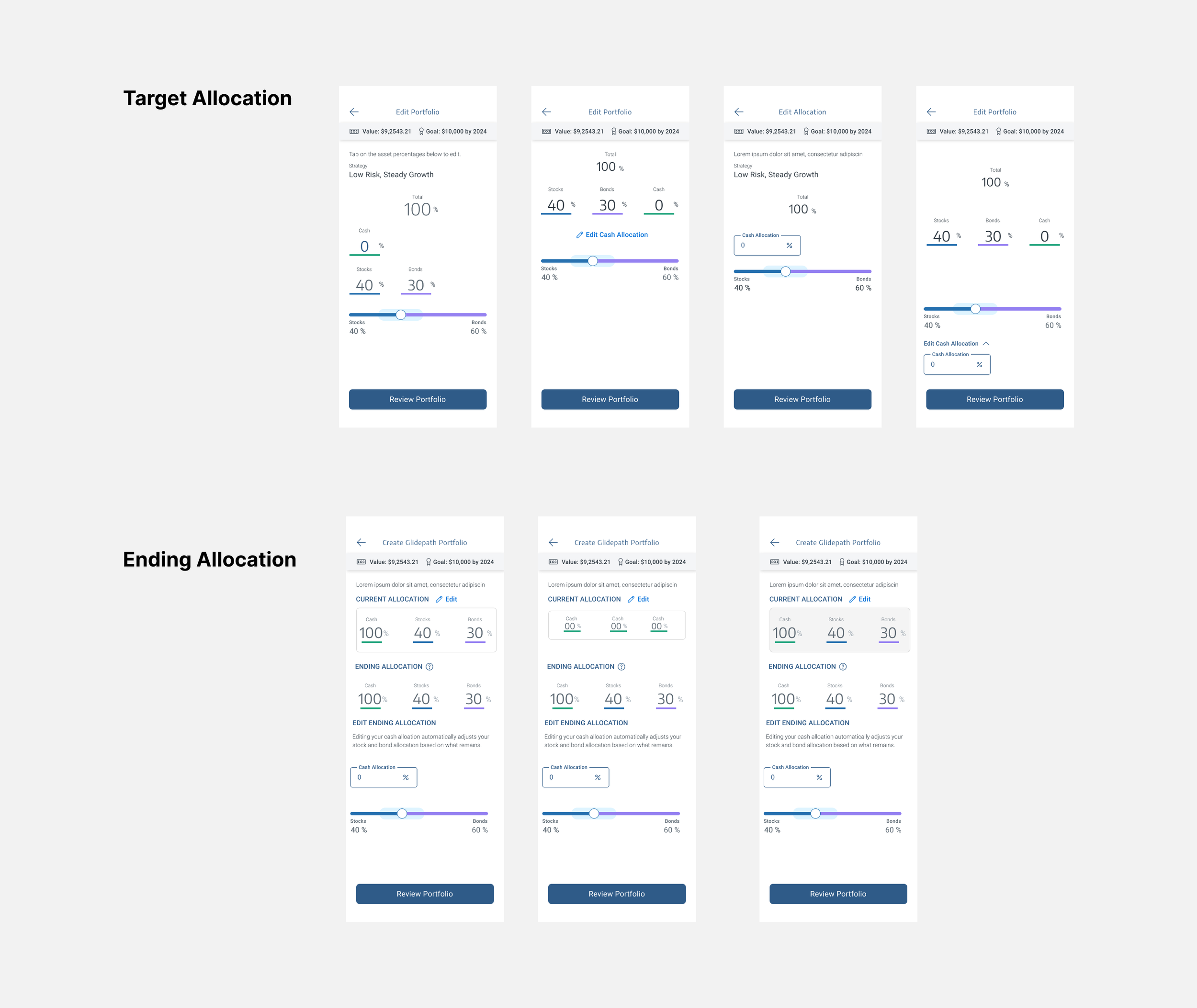Investment App & Dashboard
Summary
I led the UX design for Axos Bank's "Managed Portfolios," a robo-advising investment product for web and mobile. This project highlights the mobile designs for a key feature that enables users to automatically change their portfolio over time to meet their investment goal.
This product is now released. For more info on Axos Bank and this product, check out Managed Portfolios on the Axos Bank website.
Case Study
Role: Lead UX designer for a new iOS and web-app product. Directed end-to-end experience from concept to release.
Team: I worked in an agile environment, collaborating weekly with developers, a PM, and a user researcher. I also incorporated feedback cross-functional partners and other designers.
Project Objectives
The goal of this project was to design a “Managed Portfolios” product for Axos Bank’s new robo-advising investment account and innovate useful features to help customers easily manage and understand their investments.
Skills & Tools
User Research
User Flows
Wireframes, Mockups, Prototypes
Figma
User Research
I collaborated with a user researcher to conduct qualitative interviews to assess user needs. We aimed to determine how users add additional funds to their account, how well users understand their portfolio, and how they fund and adjust their account to meet their goals over time.
Method
Procedure: remote moderated qualitative interviews & survey
Participants: 7 individuals were recruited to participate in this study. There were 3 male and 4 female participants between the ages of 31 to 40 earning between $50K - $125K a year. They received compensation for taking part in the study.
Top Findings
Lack of transparency behind how portfolio strategy is created and how information is used results in lack of trust with the product to manage customer’s money.
Customers need to feel that their goals and financial standing are adequately taken into consideration by the product
Customers want a clear breakdown of their portfolio, and ability to project it out to the future, and a sense of control over meeting their goal
80% of customers prefer using a mobile investment platform
Quote
Supporting finding #1 & #3:
”[It] didn’t really explain why - why is it good to have this [portfolio]? There’s no place to learn more, no way to expand details. It’s giving a strategy but I don’t know why”
-User Research Participant
Supporting finding #3
“Saving up for a house is a financial goal right now. Won’t tap into money so that’s why I have aggressive and I’ll change it later to steady when it gets closer to accessing the money.”
--User Research Participant
Key Takeaways
Show breakdown of assets & explain algorithm behind portfolio strategy in a way that makes users feel understood and valued
Allow user to see different portfolio options by easily adjusting investment preferences to give users a greater sense of control and confidence in meeting their investment goals
Problem Statement
Users lack trust in our robo-advising investment platform due to lack of transparency of portfolio assets and limited control over how their portfolio will meet their financial goals.
The Solution
One solution to the problem included a feature I designed called a glidepath portfolio that allows users to control and visualize how their porfolio assets change (or “glides”) over time by setting an end target to meet their investment goal.
Final Design (Key Screens)
Final Flow
After many iterations, conversations with the PM and engineers, and feedback, this was my final task flow for editing a glidepath portfolio.
Major Design Decisions
Final Prototype of Key Feature
Based on the 2 key takeaways from our user research, I collaborated with a PM to brainstorm features and to design a key feature of this investment product: a glidepath portfolio.
A key design decision is to give users control over the allocation of their portfolio assets (stocks, bonds, and cash), while trusting the platform to manage specific assets within those categories and to clearly display them.
This prototype demonstrates the major task flow for this feature, the ability to add/edit the portfolio’s end target (the allocations of stocks, bonds, and cash users will have at the end of their investment goal) and view how their investments will change over time.
Additional Details
Design Iterations
These are some iterations I considered when trying to determine how to enable users to break up their assets into stocks, bonds, and cash.
These are some other graph concepts I considered to visualize how a portfolio will change over time.
Other key features I designed for this investment product
Ability to easily adjust stocks, bonds, and cash allocation and change the allocation over time (shown in video)
Interactive graph of past and current performance
Progress bar towards goal
Tools to project out additional funding and portfolio into the future
Both high-level and detailed view of portfolio assets
Major User Cases
Register for an account
Fund the account
Add additional funds to the account
Edit portfolio (stocks, bonds, cash)
Edit current target allocation
Edit end target allocation (glidepath portfolio only)
View how allocations automatically change over time
Set an investment goal
View progress of goal overtime
Figma Mockups
For more details or questions, feel free to contact me at yukaokina@gmail.com or reach out on LinkedIn for any pressing questions 💁♀️






